#fossil imprint
Explore tagged Tumblr posts
Text
Todays Fossil Fridays little gravel bed finds.


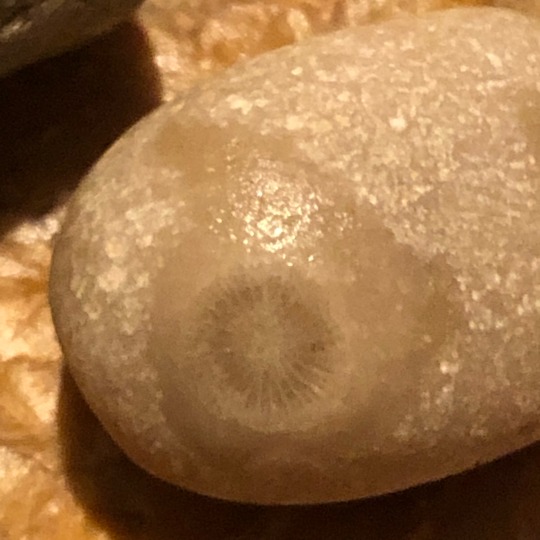

0 notes
Text
A little distraction on a somewhat stressful day: a neat rock that my sister found and gave to me, and a snail shell I found! (Also, if anyone knows anything about fossils and recognizes these, please let me know!)






#rocks#fossils#snails#shell#bugs#(all of the bug people i know also like rocks and shells)#(and some of the fossil imprints look like isopods to me)#goblincore
22 notes
·
View notes
Text
the archaeopteryx is my best friend
#after i went to bafta yesterday i went to the natural history museum#which SOLID fucking day. i even found a book about the bathysphere in a nearby bookshop so i HAD to get it#not many books in bookstores IRL that scratch the itch of incredibly niche subject i have an interest in#and all the fossils and wet specimens and stuffed creatures are my best friends#we are all going to hang out together#i loved touching the casts of skulls and fossils and feeling the imprint of it in my hands#yayyyyyyy yippeee yayyyyy
3 notes
·
View notes
Text
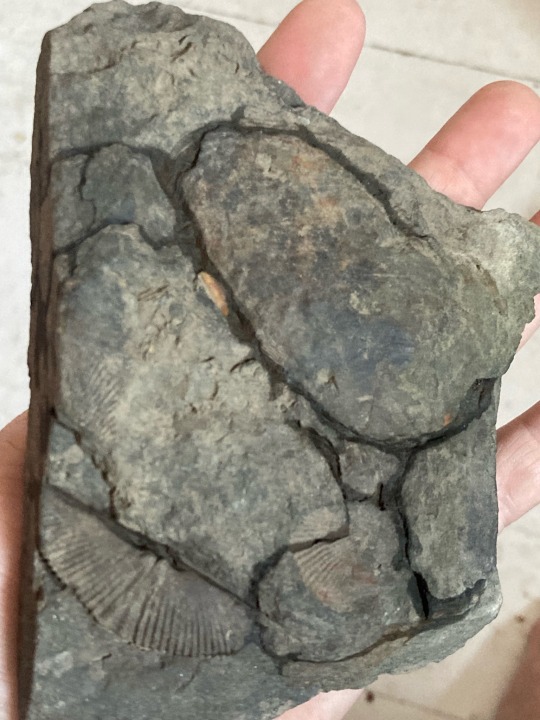

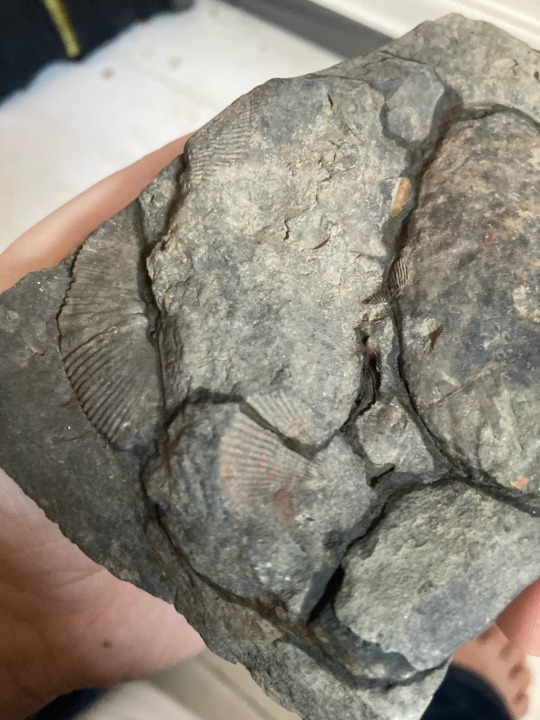

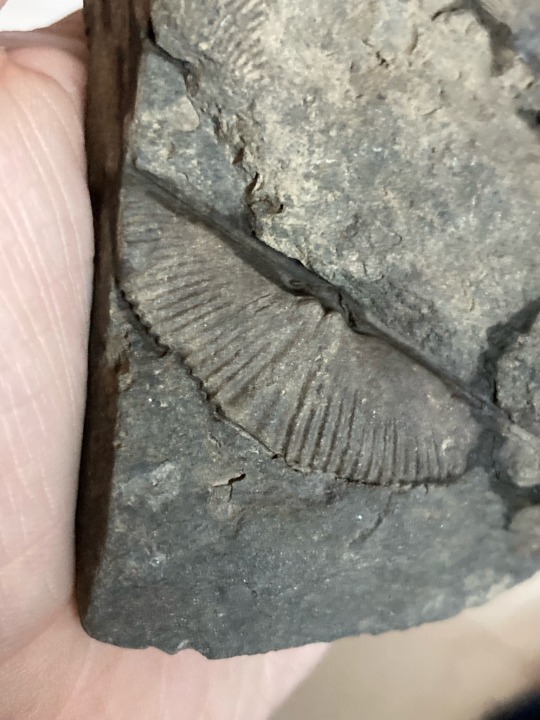
;; Guys! Look what I found today!! Fossils!!! My inner child who dreamed of paleontology is screaming right now!
There’s a ton of shells, and the big rounded oval spot is a clam!!
#;; out of dreams (ooc)#fossils#fossil#paleontology#shell fossils#clam fossil#this is huge for me!!#im so excited!#I know these kinds of fossils are super common#and museums get a ton of these and don’t display them#so I’m definitely keeping it#but yeah!#I never found anything with this many fossils as a kid!#maybe the occasional one or two shell imprints#but not whole shells or a whole clam!
19 notes
·
View notes
Text


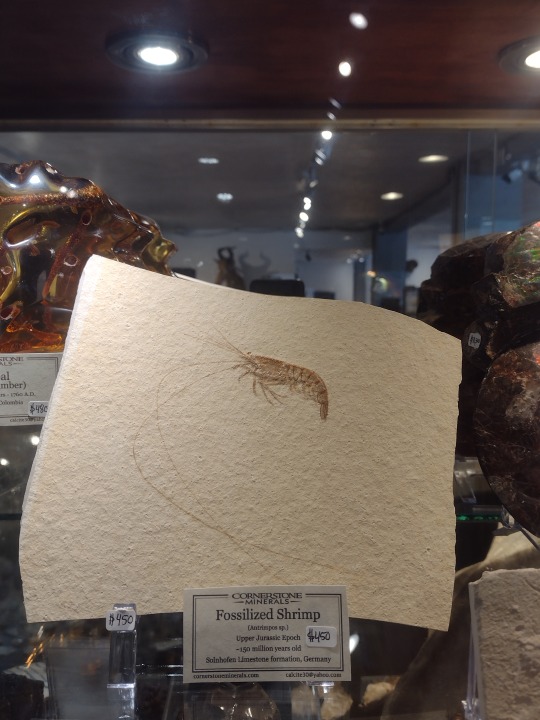

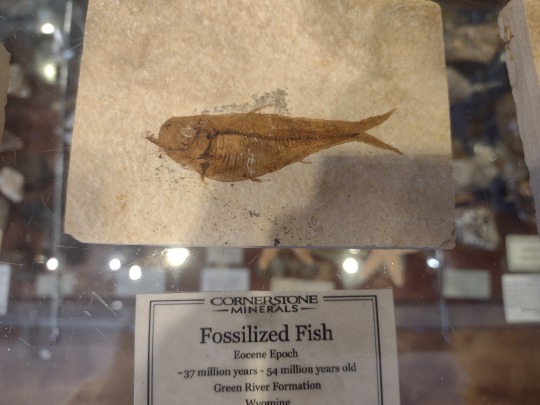
@samimarkart
I went to a cool fossil and mineral store today and saw these, very cool (was almost tempted to buy one of the shrimp pieces)
#was like oh yeah he would like these aha#fossils#jurassic#shrimp#also one bonus dragonfly#crazy how well the wings imprinted
6 notes
·
View notes
Text
youtube
#listening to this. it is like a spectre of her reaching out.#an arm. invisible. composed of waves#she's reached out and her hand is there. and i reach back. and it falls through#she wanted heard. she's heard. i hear her.#she is gone now. but like Blondie said. she radiates#like an auditory hologram. like the imprint of a thumb in cement#a fossil. a snow angel sans its maker#jay.mp3
4 notes
·
View notes
Text
I'm being normal about rocks I'm being normal about rocks I'm being so fucking normal about them I promise
#yall you can get a fish/shrimp imprint fossil for less than $60 which is wayyy less than the $200+ i expected thats so cool#trembling and foaming at the mouth like a rabid animal right now i love rocks so much theyre so fucking cool
4 notes
·
View notes
Text
experiencing symptoms of modern life overdose that even giving everything up to go live a pastoral life wouldnt remedy
2 notes
·
View notes
Note
while i have kinda chilled a bit on the interest, i still love dinosaurs as well(my room is covered in dinosaur decorations) but fun fact, my first ever oc, which was a sonic oc, is half dinosaur, half hedgehog, a hedgesaur which kid me just designed as like.....a hedgehog....with no ears or backspines.....and tipped quills and i named him......"dino" (die-no) whichi recently learned is an italian name pronounces (dee-no)
dino has had....so many versions over the years, like total of 10 now
THATS SO REAL. my bedroom has some dinosaur stuff in it like a lego brachiosaurus standee + a rex skull model sculpt (forget what specific specimen its based off of) and in my living room we (me and my boyfriend) have a big glass cabinet full of fossils. the shelves are organized into groups. we have a dinosaur shelf (of course) and our big highlights are a spinosaurus tooth bouta as long as your palm + a triceratops vertebra. for non-dinosaurs we got some big sellers like a mesohippus jaw (early horse), an elasmosaur tooth, lots of fossilized coral, some fish from the eocene, and some amber with arthropods inside. we also have a fossilized wasp my boyfriend found himself at a quarry in new york
on the topic of dinosaur ocs i used to have this series of books planned that revolved around dinosaurs time-traveling. it went through like, 5 full revamps since its creation (which was around when i was .... 12?). ive dropped the story really all together, but recently ive been like, recycling some of the characters into other projects. maybe ill post them here eventually!
#rodtalks#I LOVE DINOSAURS !!!!!!#if i had money all id buy would be fossils#ethically of course. not any thatd be better off being studied#id love an early bird with feather imprints ... or a maniraptoran#OH or a phytosaur ... not a dinosaur but still#dinosaur#paleontology
1 note
·
View note
Text

It’s Fossil Friday, so soar into the weekend with Archaeopteryx! When this dinosaur was first described in 1861, it caused a sensation. Discovered shortly after Charles Darwin proposed the theory of evolution by means of natural selection, Archaeopteryx provided an example of evolution in action—a fossil that showed the transition between reptiles and birds. The first Archaeopteryx fossils ever found included exquisitely preserved skeletons with clear imprints of wings and feathers, but also teeth and a bony tail. Today, scientists think Archaeopteryx wasn’t able to fly very well, but the species still represents a turning point in paleontologists’ understanding of the relationship between ancient dinosaurs and modern birds in the design of both its body and brain.
Learn more about the fascinating world of dinosaurs at the Museum!
Photo: © AMNH
2K notes
·
View notes
Text
Small update from today Monday, quick one hour fossil hunt, searching for an handful of colored chert shards, many in red and some banded chert collected. For starring future pics.




Showing you all the new damaged echinoid flint core, an Galerites vulgaris, likely light gray, with the red chert shard with an new mussel imprint.
Resembles strong one of an previous mussel imprint of an brachiopode.
With the brittle chunk of rock, clay with tiny mussel likely musselchalk conglomerate with imprints of snails. If soaked with mineral water it would likely breaks apart so fragile it seems.
Has the form and size of an small potato.
#fossil collecting#fossil hunting#mussel fossil#mussel imprints#fossil imprint#chert rock#echinoid#muschelkalk
0 notes
Text
A surprising discovery in the feathers of a fossil vulture from central Italy has revealed that volcanic deposits can preserve delicate tissue structures in unprecedented detail, offering new insights into the fossilisation process. In 1889 in the foothills of Mount Tuscolo, 25km south-east of Rome, farm workers discovered something extraordinary. While digging the ground for a new vineyard, they encountered a layer of bedrock with a strange void. This contained the skeleton of a large bird, including apparent imprints of its plumage on the surrounding rocks.
Continue Reading.
792 notes
·
View notes
Text
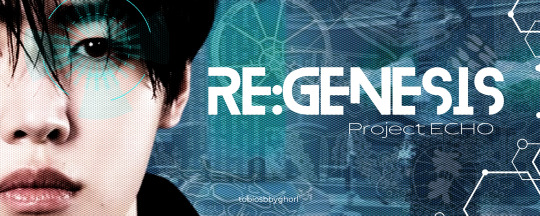
pairing: scientist!sunghoon x scientist! reader
wc:10.5k
released date: 05.17.2025
warning: PURE FICTION!!
synopsis: In the quiet of her lab, Dr. Y/N, a skilled scientist, sets out on a risky mission to bring back her late fiancé, Park Sunghoon, who died in a car accident. Using his preserved DNA, she creates a clone that grows rapidly in just two years. When Sunghoon wakes up, he faces the difficult reality of being brought back to life and the moral issues surrounding Y/N's actions.
a/n: ITS HERE!! Hope you guys will love it as much as I did writing it! feedbacks,likes and reblogs are highly appreciated!

In the cold glow of my underground biotech lab, silence is sacred. Down here, beneath layers of steel and earth, the world doesn’t exist. No grief. No time. Just me. Just him.
The capsule glows in the center of the room—a vertical womb of steel and glass, pulsing faintly with blue light. Suspended inside, wrapped in strands of bio-filaments and artificial amniotic fluid, is the reason I wake up in the morning. Or stay awake. I don’t know the difference anymore.
Park Sunghoon.
Or… what’s left of him.
One year ago, he died on his way to our civil wedding. A drunk driver. A rainy street. A second too late. I got the call before I even zipped up my dress. I still remember the way my coffee spilled all over the lab floor when my knees gave out. I never cleaned it. It’s still there, dried in the corner. A fossil of the moment my world cracked open.
⸻
He used to say I was too curious for my own good.
That I’d poke the universe too hard one day and it would poke back.
Maybe this is what he meant.
⸻
Sunghoon and I were both scientists—biotech researchers. We studied regenerative cloning, theorized about neural echo imprinting, debated ethics like it was foreplay.
He was against replicas. Always. “A copy isn’t a soul,” he’d say. “It’s just noise pretending to be music.”
But the day he died, I stopped caring about music.
I just wanted to hear his voice again.
⸻
I had everything I needed. A sample of his bone DNA—collected after a minor lab accident years ago and stored under a pseudonym. His blood type, genome map, neural scan from our first brain-simulation trial. A perfect match, all buried in our old hard drives. He never knew I kept them. Maybe he would’ve hated me for it.
Maybe I don’t care.
I called it Project ECHO.
Because that’s what he was now.
An echo. A ripple in the void.
⸻
The first version—ECHO-1—was a failure.
He looked like Sunghoon. But he never woke up. I ran every test. Monitored every vital. Adjusted nutrient cycles, protein growth, heartbeat regulators. But something in him was missing—something I couldn’t code into cells.
A soul, maybe. Or timing.
He died the second I tried to bring him out.
I cremated and buried that version in the garden, under the cherry tree he planted the first spring we moved in. I didn’t cry at the funeral. I just stood there holding the urn and whispered, “I’ll get it right next time.”
⸻
ECHO-2 was different.
I restructured the genome to prevent cellular decay. Added telomere stabilizers to delay aging. Enhanced his immune system. This time, I built him stronger. Healthier. The version of Sunghoon that would’ve never gotten sick that winter in Sapporo, or fainted in the elevator that one night after forgetting to eat. That version who could live longer. With me.
But the rest—I left untouched.
His smile. His hands. The faint mole scattered in his face. The way his hair curled when wet. All exactly the same. It had to be. He wouldn’t be Sunghoon without those things.
I even reconstructed his mind.
Using an illegal neural mapping sequence I coded from fragments of our joint research, I retrieved echoes of his memory—dream-like reflections extracted from the deepest preserved brain tissue. It wasn’t perfect. But it was him. Pieces of him. The things he never got to say. The life he never finished.
⸻
It took two years.
Two years in the dark, surrounded by synthetic fluid and filtered lights, modifying the incubator like a cradle built by obsession. I monitored every development milestone like a parent. I watched him grow. I whispered stories to him when the lab was quiet, played him our favorite records through the tank’s acoustic feed, left him notes on the console like he could read them.
⸻
One night, I touched the tank and felt warmth radiate back. His fingers twitched.
A smile cracked on his lips, soft and sleepy.
And I whispered, “You’re almost here.”
⸻
Now he floats before me—grown, complete, and terrifyingly familiar. His chest rises and falls steadily. Muscles formed and defined from synthetic stimulation. His brain is fully developed. His body—twenty-five years old. The age he was when he died. The age we should’ve gotten married.
And now, he’s ready.
⸻
The console buzzes beside me.
“Project ECHO – Stage V: Awakening. Confirm execution.”
My fingers hover. The hum of the lab grows louder. My heart beats so hard I feel it in my throat.
This is it.
The point of no return.
I press enter.
The Awakening didn’t look like the movies.
There was no dramatic gasp, no lightning bolt of consciousness.
It was subtle.
His eyes fluttered open, hazy and uncertain, like the first morning light after a long storm. They didn’t lock onto me at first. He blinked a few times—slow, groggy—and stared at the ceiling of the pod with a confusion so human it made my knees go weak.
Then his gaze shifted.
Found me.
And held.
Just long enough to knock the breath from my lungs.
“Sunghoon,” I whispered.
His lips barely moved. “…Y/N?”
And then—just like that—he slipped under again.
His vitals were stable, but his body couldn’t process full consciousness yet. It was expected. I designed it that way. A controlled emergence. Gentle. Like thawing from ice.
He would wake again. Soon.
⸻
Phase VI: Integration.
I had the room ready before I even began the cloning process. A private suite in the East Wing of my estate, modified to resemble a recovery room from a private hospital: sterile whites and soft blues, filtered natural lighting, automated IV drips and real-time vitals displayed on sleek black monitors. The scent of lavender piped faintly through the vents. His favorite.
I moved him after he lost consciousness again—quietly, carefully. No one else involved. Not even my AI assistant, KARA. This part was just mine.
Just ours.
He lay in the bed now, dressed in soft gray cotton, sheets pulled up to his chest. The faint hum of the machines harmonized with his breathing. It was surreal. Like watching a ghost settle into a life it forgot it had.
I perched on the armchair across from him, the dim lighting casting long shadows over his face.
“You’re safe,” I murmured, brushing a strand of hair from his forehead. “And when you wake up… everything will be in place.”
⸻
I spent the next forty-eight hours setting the stage.
Fabricated records of a traumatic car accident—minor amnesia, extended coma, miraculous survival. Hacked into the hospital registry and quietly added his name under a wealthy alias. I made sure the media silence was absolute. No visitors. No suspicious calls. A full blackout.
I memorized the story I would tell him. Rehearsed it like a script.
We had been on our way to City Hall. A drunk driver ran a red light. I survived with minor injuries. He hit his head. Slipped into a coma. No signs of brain damage, but long-term memory instability was expected.
He’d been here ever since. Safe. Loved. Waiting to wake up.
And now—he had.
⸻
On the morning of the third day, I heard movement.
Soft. Shuffling. Sheets rustling.
I turned from the monitor just as he groaned softly, his head turning on the pillow.
“Sunghoon?”
His eyes blinked open again, more alert this time. Still groggy, but present.
“Y/N…?” he rasped.
I rushed to his side, heart in my throat. “You’re okay. You’re safe.”
His brows knit together, voice hoarse. “What happened?”
“You were in an accident,” I said gently. “The day of our wedding. You’ve been in a coma. Two years.”
His eyes widened—just a little. Then flicked down to his hands. The IV. The machines. The unfamiliar room.
“…Two years?”
I nodded, bracing for the confusion. “You survived. But it was close. We weren’t sure you’d ever… come back.”
He said nothing.
Just stared at me.
Like he was trying to remember something he couldn’t quite reach.
“…Why does it feel like I never left?” he whispered.
I smiled softly. Forced. “Because I never left you.”
And for now, that was all he needed to know.
But deep down, behind those eyes, behind the half-forgotten memories and muscle memory that wasn’t truly his—
Something flickered.
Something not asleep anymore.
He was awake.
And the lie had begun.
The days that followed passed in a quiet rhythm.
He adjusted faster than I anticipated. His motor skills were strong, his speech patterns natural—so much so that sometimes I forgot he wasn’t really him. Or maybe he was. Just… rebuilt. Reassembled with grief and obsession and the memory of love that still clung to me like static.
I stayed with him in the hospital wing, sleeping on the pullout beside his bed. Every morning he’d wake before me, staring out the wide window as if trying to piece together time. And when I asked what he was thinking, he always gave the same answer:
“I feel like I dreamed you.”
On the seventh day, he turned to me, his voice clearer than ever.
“Can I go back to our room?”
I paused, fingers wrapped around the rim of his tea mug.
He still called it our room.
I nodded.
“Yeah,” I said. “You’re strong enough now.”
And so we did.
I helped him down the hallway, hand in his, the same way I’d imagined it during the long nights of Phase II. His steps were careful, measured. But his eyes… they lit up the moment we entered.
It looked the same.
The navy sheets. The low lights. The picture of us by the bookshelf—framed and untouched. His books still on the shelf in alphabetical order. His favorite sweatshirt folded at the foot of the bed like I had never moved it.
He smiled when he saw it. “It feels like nothing’s changed.”
Except everything had.
I didn’t say that.
⸻
He asked about the lab a few nights later. We were curled together in bed—his head on my shoulder, our legs tangled like old habits finding their way home.
“How’s the lab?” he asked, voice soft in the dark. “Are we still working on the neuro-mirroring project?”
My heart skipped.
I’d gotten rid of everything. The pod. The DNA matrix. The prototype drafts. Scrubbed the drives clean. Smashed the external backups. Buried the remains of ECHO-1 under a new tree. The lab was as sterile as my conscience was not.
I turned toward him, brushing my thumb over the scar that curved above his brow. The one that hadn’t been there before the “accident.”
“It’s being renovated,” I said carefully. “After the crash… I couldn’t go in for a while. So I decided to redo it. Clear things out. Start over fresh.”
He nodded slowly. “Makes sense.”
He didn’t ask again.
And just like that, life began to move forward.
He followed me around the house again, stealing kisses in the kitchen, playfully poking fun at the way I never folded laundry properly. He rediscovered his favorite coffee, laughed at old movies like they were new, held my hand under the stars like it was the most natural thing in the world.
But sometimes—when he thought I wasn’t looking—he’d stare at his reflection too long. Tilt his head. Press his fingers to his chest like he was checking if something was still there.
Maybe he felt it.
The echo of what he was.
But if he did, he never said.
One night, wrapped up in each other’s warmth, he whispered into my neck, “I don’t know how I got so lucky to come back to you.”
I pressed a kiss to his temple, forcing a smile as my heart ached beneath the surface.
“I guess some things are just meant to find their way back.”
Even if they were never supposed to.
Time softened everything.
The sterile silence of the house began to fade, replaced by the quiet thrum of life again—the clink of mugs in the morning, the shuffle of his bare feet on the hardwood, the lazy hum of music playing from a speaker that hadn’t been touched since he died. I started to breathe again, and so did he.
Like we were rewriting the rhythm we’d lost.
—
Our first night out felt like time travel.
He picked the place—a rooftop restaurant we always swore we’d try, back when work kept getting in the way. I wore the same navy dress I had worn on our second anniversary. He noticed. His hand slid into mine under the table like it belonged there, his thumb tracing invisible patterns against my skin.
Halfway through dessert, he leaned in, grinning with chocolate at the corner of his lip.
“You still scrunch your nose when you’re pretending to like the wine,” he teased, eyes gleaming.
I blinked. “You remember that?”
He nodded slowly. “It just feels like… I always knew.”
I smiled, heart aching in that strange, quiet way it always did now.
“You’re right,” I said, brushing the chocolate off his lip. “You always did.”
Even grocery shopping with him became a date.
He pushed the cart like a child let loose, tossing in things we didn’t need just to make me laugh. At one point, he held up a can of whipped cream with the most mischievous glint in his eye.
“For movie night,” he said innocently.
I arched a brow. “For the movie or during the movie?”
He smirked. “Depends how boring the movie is.”
We walked home with one umbrella, our fingers interlaced in the rain, and the world somehow felt smaller, warmer.
He burned the garlic the first time.
“I told you the pan was too hot,” I said, waving smoke away.
“And you told me to trust you,” he countered, looking absurdly proud of his crime against dinner. “Besides, I like it crunchy.”
“You like your taste buds annihilated, apparently.”
We ended up ordering takeout, sitting on the kitchen floor, eating noodles out of the box with chopsticks, laughing about how we’d both make terrible housewives.
But the next night, we tried again.
He stood behind me, arms around my waist, guiding my hands as I chopped vegetables.
“You used to do this,” I said softly. “When I first moved in.”
“I know,” he murmured. “It’s one of my favorite memories.”
Cuddling became a ritual.
He always found a way to get impossibly close—sprawled across the couch with his head in my lap, humming contentedly while I read a book or ran my fingers through his hair.
Sometimes we didn’t speak for hours.
Just the quiet breathing, the rise and fall of his chest, his heartbeat echoing faintly against my thigh. Real. Solid. Present.
It was a miracle I could touch.
One night, as rain tapped gently on the windows and he was half-asleep on my shoulder, he whispered:
“I feel safe with you.”
I held him tighter.
Because if I let go—even for a second—I was afraid he might vanish again.
⸻
Love blossomed differently this time.
Slower. Deeper. Less like fire, more like roots. Tangled and unshakable.
And sometimes, in the quiet of our shared bed, I would watch him sleep and wonder if it was love that brought him back.
Or obsession.
But when he opened his eyes and smiled like the sun lived behind them, I told myself it didn’t matter.
He was here.
And that was enough.
For now.
⸻
I woke with a jolt, my heart pounding so violently it threatened to break free from my chest. The nightmare was still fresh, its vividness clinging to my mind like the smoke of a fire.
Sunghoon.
He was in the car again—his face frozen in the moment before everything shattered, his eyes wide with disbelief. The screech of tires, the crash. His body limp. The way I couldn’t reach him no matter how hard I screamed.
I gasped for air, my fingers clutching at the sheets, tangled in the panic that still gripped me.
My breath came in ragged bursts as I sat up, drenched in sweat. My chest heaved with the rawness of the memory, the terrible what-ifs that still haunted me.
A hand gently touched my back.
“Y/N?”
His voice, soft and concerned, cut through the haze of the nightmare. I froze for a moment, the world around me still spinning from the disorienting shock.
I turned, and there he was—Sunghoon—sitting up beside me in the bed, his eyes full of concern. The soft glow of the bedside lamp illuminated his face, and for a moment, it was almost as if everything had shifted back into place.
But only for a second.
“Are you alright?” He asked, his voice warm with worry.
I swallowed hard, trying to steady my breathing. “I… I just had a nightmare,” I whispered, avoiding his eyes. My heart was still trying to settle, and I didn’t want him to see the fear in my face. I didn’t want him to see how broken I still was.
Sunghoon leaned forward, his hands reaching out to cradle my face gently. He brushed a strand of hair away from my forehead, his touch so familiar, so tender.
“Nightmares are just that,” he said softly, his thumb grazing my skin. “They aren’t real. I’m here.”
I nodded, trying to pull myself together, but the knot in my throat wouldn’t loosen. There was something about the way he said it—so assuredly. So real. Like the past didn’t exist, like he had never been gone.
Like I hadn’t created him from fragments of grief and obsession.
He sat next to me, his arm around my shoulders as I leaned into him. The warmth of his body, the steady rise and fall of his chest, slowly calmed me. I closed my eyes and breathed in the scent of him—the same as it had always been.
“I’m here,” he repeated, his voice a quiet lullaby.
But somewhere deep inside, I couldn’t shake the question that had haunted me since the moment I had revived him: Who was he really? Was this truly the Sunghoon I had loved, the one who had filled my life with light? Or was this just a perfect imitation, a replica of my memories? An echo of a man who would never truly exist again?
I wanted to believe he was him. I needed to believe it.
But as he held me, his warmth seeping into my skin, I couldn’t deny the doubt that gnawed at my soul.
“Y/N?” he murmured, sensing my tension.
“Yeah?” I whispered, pulling myself closer into his arms.
He tilted my chin up, his gaze intense as he met my eyes. “I love you,” he said quietly, with such certainty that for a moment, it almost felt real—like the love we’d always shared before the accident, before everything shattered.
And in that moment, I wanted to believe it. I wanted to forget everything else, to let myself drown in the reassurance that this was him—my Sunghoon.
But the ghosts of the past still lingered in the corners of my mind.
“I love you too,” I replied softly, my voice shaky but true.
And for a few minutes, we just sat there, holding each other in the stillness of the night.
But as I closed my eyes and let the warmth of his embrace lull me back to sleep, the doubt remained.
Would I ever be able to escape the shadows of my own creation?
As the days passed, the weight of my doubts gradually lightened. Sunghoon’s presence—his warmth, his voice, the way he smiled—reminded me more and more of the man I had once loved, the man who had been taken from me.
The fear, the gnawing uncertainty that had once been constant in the back of my mind, slowly started to fade. Each moment we spent together was a little piece of normalcy returning. He didn’t just look like Sunghoon. He was Sunghoon. In every little detail—his laugh, the way he tilted his head when he was deep in thought, how he always made the coffee exactly the way I liked it. His presence was enough to reassure me that this was him, in all the ways that mattered.
We went on walks together, hand in hand, strolling through the garden I had planted the day we first moved into the house. It was filled with flowers that bloomed year-round—just like the memories I had of us, blooming and growing despite the heartbreak.
We laughed, reminiscing about everything we had shared before. Sunghoon was never afraid to be vulnerable with me, and it felt like we were picking up right where we left off. His sense of humor, always dry and sarcastic, never failed to make me smile. And slowly, I began to accept that the man who stood beside me, laughing at his own jokes, was truly my Sunghoon.
One night, as we cooked dinner together, I watched him carefully slice vegetables, his movements graceful and practiced. It was simple, domestic, but it felt like everything I had longed for since he was gone.
“Don’t forget the garlic,” I reminded him, teasing.
He shot me a look, smirking. “I remember.”
I smiled, feeling the warmth of the moment settle into my bones. This was real. The way he made sure I was comfortable in the kitchen, the way we worked together without needing words—this was our life, reborn.
The more time we spent in the house, the more at ease I became. We cooked together, watched old movies, read books side by side, and held each other as we fell asleep at night. There were no more questions in my mind. No more doubts. Just the feeling of peace settling over me, like the calm after a storm.
Sunghoon never asked me about the lab. And I never had to lie, because there was no need to. The lab had been dismantled long ago, every trace of Project ECHO erased. It was as if it never existed. My obsession, my grief—gone.
In its place was this. A second chance.
“I don’t think I’ll ever stop loving you, Y/N,” he said one evening as we sat on the couch, the sound of rain tapping against the windows. He held me close, his head resting against mine. “No matter what happens, no matter what changes… you’re the one for me.”
I turned to look at him, searching his eyes for something—anything—that might reveal the truth I feared. But there was nothing. Only love. Real love.
“I feel the same,” I whispered back, brushing my lips against his.
For a moment, the world outside disappeared. There was no past, no lab, no questions. There was only Sunghoon, here with me. And that was enough.
The days continued to pass in a peaceful blur of moments that I had once thought lost forever. With each sunrise, my doubts melted away, and with every touch, every kiss, I felt more certain that this was real. That he was real.
Sunghoon might not be the exact same person who had walked out of that door all those years ago—but in my heart, it didn’t matter. He was my Sunghoon, and that was all I needed.
Together, we built a life—one step at a time. And this time, I wasn’t afraid.
I wasn’t afraid of the past. I wasn’t afraid of the future.
I was just… happy.
Sunghoon’s POV
It had been a year since I came back to her, and in that time, I had slowly convinced myself that everything was okay. That what we had, what I had, was enough. That the woman I loved, the woman who had saved me—had done so much more than just revive me—wasn’t hiding any more secrets. But the past… it always had a way of creeping up, didn’t it?
I wasn’t snooping, not exactly. I was just cleaning up. I had offered to help her tidy up the office since she had been so caught up in her work lately, and well, I had nothing else to do. After all, it’s been a year now, and I’ve come to understand her more than I could ever have imagined. She’d been distant the past few days, and it made me uneasy. The kind of unease that makes you feel like there’s something you should know, but you can’t quite put your finger on it.
It was as I was sorting through the boxes in her home office—one that she hadn’t allowed me to visit much—that I found it.
A video tape.
It was tucked behind a stack of old files, half-buried in the clutter. At first, I thought nothing of it. She was always meticulous about her work, so maybe it was just an old research document, something from her past. But when I saw the words “Project ECHO – Development and Breakdown” scrawled on the side, my heart stopped. I felt a sickening knot tighten in my chest, and instinctively, my fingers curled around it.
What was this?
My thoughts raced as I fumbled with the tape, my hands trembling just slightly as I slid it into the old VCR player she kept in the corner of the office. The screen flickered to life.
There I was.
Or… the version of me that had once existed. The first one. My mind was running faster than my eyes could follow the images flashing on the screen. I saw footage of my development, from the initial growth stages to the first electrical impulses firing in my brain, as well as my physical appearance being tested and adjusted.
My stomach turned as the video documented every breakdown of my body—every failed attempt to bring me to life. I saw the wires, the artificial fluids, the machines that I had been hooked up to before I had opened my eyes, before I had woken up in that hospital room.
But it was the last part of the video that hit hardest. There, in her cold, emotionless voice, Y/N narrated her thoughts, her failed efforts, her obsession with recreating me.
“I couldn’t get it right… not the first time. But I will, because I have to. For him. For us.”
My chest tightened as the realization hit me like a brick. She had known the entire time. She had created me. I wasn’t the Sunghoon who had died. I was a version of him. A shadow of the real thing.
The screen went black, but the words echoed in my mind like an incessant drumbeat.
For him. For us.
The pain of that truth was like a knife twisting in my gut. The woman I loved had spent years trying to recreate me, to bring me back—because she couldn’t let go. She couldn’t let me go. But she never told me. She never let me in on the truth of it all.
I was a lie.
I wasn’t real. And all this time, I had been believing I was the same Sunghoon she had lost. But I wasn’t.
I could feel the tears stinging my eyes as I reached for the nearby papers, pulling them out in a frantic rage. More documents. More of my development—charts, genetic breakdowns, notes about my failed memories, and even the procedures Y/N had carried out. Every page proved it. I wasn’t just a clone; I was the culmination of her grief and desire.
The door to the office opened quietly behind me, and I didn’t need to turn around to know who it was. The air in the room grew thick, suffocating. I could feel her presence like a weight pressing down on me.
“Sunghoon,” she whispered, her voice barely a murmur.
I finally turned to face her. She looked pale, her eyes wide, clearly having seen the documents I had scattered across the room. She knew. She knew what I had found.
“Why didn’t you tell me?” I choked out, my voice raw. “Why didn’t you tell me the truth, Y/N?”
Her eyes flickered with guilt, and for a moment, I thought she might say something—anything to explain, to apologize. But instead, she took a step back, her hands wringing together nervously.
“I didn’t want you to hate me,” she whispered, her voice breaking. “I didn’t want to lose you again. I—I thought maybe if you didn’t know… maybe we could have our life back. I just wanted to have you here again, Sunghoon.”
My hands balled into fists at my sides, and I could feel the tears building in my eyes. “But I’m not him, am I? I’m not the real Sunghoon. I’m just… this.” I gestured around at the papers, at the video, at the mess that had been my life. “I’m a replica. A copy of someone who doesn’t exist anymore. How could you do this to me?”
She stepped forward, her face pale with fear, but her voice was firm. “I didn’t mean for it to go this far. I just wanted you back, Sunghoon. I couldn’t let go. I couldn’t lose you. You were taken from me so suddenly, and I couldn’t… I couldn’t live with the thought that you were gone forever.”
I looked at her, the woman who had once been everything to me—the one who I thought had rebuilt me out of love, not out of desperation.
“Do you think I’m the same person? Do you think I can just pretend that I’m the man I was before? How could you think I wouldn’t want to know the truth?” My voice cracked, emotion flooding out of me like a dam breaking. “How could you do this?”
Her face crumpled, and I saw the tears well up in her eyes. “I’m so sorry, Sunghoon,” she whispered, her voice barely audible through the sobs. “I thought if I could just give you everything back, we could start over. But I was wrong. I—I should’ve told you from the beginning.”
I could feel the overwhelming ache in my chest, the confusion, the betrayal. But more than that, I felt the loss of something far deeper: trust. The trust that she had built between us was gone in an instant.
“You’re right. You should’ve told me,” I whispered, stepping back, my throat tight. “I need some space, Y/N. I can’t… I can’t do this right now.”
I turned and walked out of the room, my heart shattering with each step.
I paused at the door, the weight of her voice sinking into me like a stone. I didn’t turn around, not right away. The question lingered in the air, hanging between us, impossible to ignore.
“If I was the one who died, would you do the same?”
Her words were quiet, but they cut through the silence of the room with precision, like a knife through soft flesh. I could feel the tension in the air—the desperation in her voice, the need for an answer. She was asking me to justify her actions, to somehow make sense of everything she had done.
I clenched my fists at my sides, fighting the urge to turn and lash out. But I couldn’t do it—not when the pain of her question was a reflection of everything I was feeling.
“I… I don’t know,” I finally muttered, my voice barely a whisper. “Maybe I would. I can’t say for sure. But I don’t think I’d ever hide the truth from you. I wouldn’t keep you in the dark, pretending that everything was okay when it wasn’t.”
Her soft, broken gasp from behind me reached my ears, but I couldn’t face her—not yet. Not when the anger and hurt were still so raw.
“You don’t know what it’s like to lose someone you love that much,” she said, her voice trembling with emotion. “I couldn’t stand the thought of living without you, Sunghoon. I thought… maybe if I could just bring you back… we could have our future. But now, I see how selfish that was. How wrong.”
I wanted to say something—anything—to ease her pain, but the words stuck in my throat. The truth was, part of me still wanted to reach out to her, to hold her, to tell her it was going to be okay. But I wasn’t sure if that would be enough. Would it ever be enough?
“I need time, Y/N,” I said quietly, my voice cracking. “I need to think. About all of this. About us.”
The silence that followed was heavy, unbearable. And then, finally, I walked out the door, leaving her behind, standing in the wreckage of her choices—and my own shattered heart.
The days stretched on like a slow burn, each passing hour marked by the tension that filled every corner of our shared space. We were still in the same house, the same home, but it felt like we were living in different worlds now. The walls felt thicker, the silence heavier.
I moved through the house in a daze, keeping to myself more often than not. Y/N and I had an unspoken agreement—it was easier this way. She’d stay in the study or the kitchen, and I’d retreat to the room we used to share, now feeling like an alien space, void of the warmth it once held. We didn’t speak much anymore, and when we did, it was brief—polite, almost mechanical.
There were moments when I caught a glimpse of her, standing in the hallway, her head bent low, a soft frown on her face. Other times, she’d walk by without looking at me, her eyes fixed on the floor, avoiding my gaze as if she feared what might happen if she met my eyes for too long. I wanted to reach out, to say something—anything—but every time I did, the words felt inadequate, like they couldn’t possibly capture the weight of everything that had changed.
One evening, I found myself sitting in the living room, staring out the window at the moonlit garden. I could hear her footsteps in the hallway, the soft sound of her presence lingering in the air. For a moment, I thought she might come in, might sit beside me like she used to. But she didn’t. Instead, the silence stretched between us again, a reminder of the distance we had created.
I exhaled sharply, rubbing my eyes as frustration built inside me. The whole situation felt suffocating—like I was trapped between what I wanted and what had happened. I didn’t know how to fix it, or even if it could be fixed. There was so much to unravel, so many emotions to sort through. And then there was the truth—the truth of who I was now. Not just a man trying to find his way back to a life that no longer existed, but a clone—a replica of someone who once had a future, now burdened with a past he didn’t truly own.
The sound of her voice from the kitchen broke my thoughts.
“Dinner’s ready,” she called softly, her voice almost too gentle, too careful.
I hesitated for a moment, staring at the untouched glass of water on the coffee table. The empty space between us felt too vast to cross, but eventually, I stood up, making my way to the kitchen.
We sat across from each other, the dim light from the pendant lamp above casting shadows on the table. There were no small talks, no jokes exchanged like before. We ate in silence, the clinking of silverware the only sound between us. Every so often, I would look up, meeting her gaze for a fleeting second, but neither of us had the courage to speak the words that were hanging in the air.
The food was good, as always, but it didn’t taste the same. The flavor of everything felt hollow, like a memory that wasn’t quite mine.
When the meal was over, I helped clear the table, my movements stiff. The kitchen felt too small, the air too thick.
She turned to face me then, her expression unreadable, her eyes dark with something I couldn’t quite place. “I’m sorry,” she said quietly, her voice barely a whisper. “For everything.”
I swallowed hard, the knot in my chest tightening. “I know you are. I… I just don’t know what to do with all of this.”
Her eyes flickered with unshed tears, and she stepped back, as though the space between us could somehow protect her from the weight of the moment. “I never wanted to hurt you, Sunghoon,” she murmured, her words full of regret. “I thought… I thought if I could just bring you back, we could have another chance. But now I see how wrong I was.”
I nodded slowly, trying to process the ache in my chest. “I don’t know how to fix this either. But I know… I know I need to understand who I am now. And what we are.” My voice trembled, but I fought it back. “I need time.”
“I understand,” she whispered, her voice breaking slightly. “Take all the time you need.”
It felt like a farewell, and yet, we stayed in the same house. In the same life, but now it was something unrecognizable.
The next few weeks passed in the same quiet, empty rhythm. We moved around each other, living parallel lives without ever crossing paths in any meaningful way. There were mornings where I would wake up to find her sitting on the couch, staring at her phone, or nights where I’d catch her reading a book in the dim light.
Sometimes, I would linger by the door to her study, wondering if I should knock, ask her how she was feeling, but each time, I backed away, unsure if I was ready to face the answers she might give.
At night, I would lie in bed, staring at the ceiling, wondering if this was how we were going to live—side by side but separate. I missed her. I missed us. But I couldn’t shake the feeling that I was just a shadow of the man she once loved, and that was a weight I wasn’t sure she could carry anymore.
One night, as I lay in the dark, unable to sleep, I heard the soft sound of her crying. The quiet sobs seeped through the walls, and my heart clenched painfully in my chest.
I wanted to go to her. Hold her. Tell her everything would be okay. But I couldn’t. I didn’t have the words anymore.
And maybe, I never would.
The night stretched on, and despite the tension that hung thick in the house, I managed to fall into an uneasy sleep. The weight of everything—our fragmented relationship, the guilt, the uncertainty—had left me exhausted, though the sleep I sought felt shallow and restless.
It was around 3 AM when I was jolted awake by the softest sound—a faint, broken sob. My eyes snapped open in the dark, my heartbeat quickening. I froze, listening carefully, the sounds of her grief pulling at something deep within me.
It was coming from the direction of her room.
At first, I told myself to ignore it. After all, she had her own space, her own pain, and I had my own to deal with. But the sound of her brokenness—quiet and desperate—was too much to ignore.
Slowly, I slid out of bed, my bare feet padding softly on the cool floor. I moved silently through the house, drawn to the soft, muffled sounds echoing through the walls. When I reached the door to her room, I paused.
She was crying, the kind of sobs that wracked her body and left her vulnerable. I hadn’t heard her cry like this before—unfiltered, raw, as if the dam inside her had finally broken.
The light from her bedside lamp flickered weakly, casting long shadows on the walls. She was sitting on the edge of the bed, her head buried in her hands, the tears falling freely, like they couldn’t be held back anymore.
I stood there, frozen, my chest tightening at the sight. My first instinct was to rush to her side, to pull her into my arms and whisper that everything would be alright. But I didn’t. I just watched from the doorway, a spectator in my own home.
The sound of her pain made me feel powerless, as if I were too far gone—too far removed from who I once was to even be the man she needed. I opened my mouth to speak, but no words came. The silence between us felt like an unspoken agreement, a distance neither of us knew how to cross.
And then she spoke.
“I’m sorry… Sunghoon,” she whispered to the empty room, the words slipping from her like a confession she hadn’t meant to make. “I thought I could fix it. I thought… if I could just bring you back, we could be happy again. But I don’t know what I’ve done anymore. I don’t know who you are. Or if you’re even really you.”
Her voice cracked at the end, and I could hear the weight of her regret, the guilt, the fear of everything she’d done.
The flood of emotions hit me all at once—anger, sadness, confusion—and yet, there was something else, too. The overwhelming desire to reach out to her. To show her that I understood, that I knew how hard this was for her.
But still, I stayed frozen. Silent. The words that had once flowed so easily between us now felt like strangers.
She wiped her eyes with the back of her hand, but it didn’t stop the tears.
“I was selfish,” she muttered to herself, her voice barely audible now. “I couldn’t let go. I wanted you back, no matter the cost. And now… I don’t know if you can ever forgive me.”
That was when the weight of it all hit me fully—the pain she had been carrying, the burden she had placed on herself. The fear she had been living with, not knowing if I could ever truly forgive her for bringing me back.
I stepped forward then, unable to watch her fall apart without doing something.
“Y/N,” I said quietly, my voice hoarse, betraying the emotions I had kept bottled up for so long.
She immediately stiffened, her breath hitching as she quickly wiped her face, trying to pull herself together. “You’re awake,” she said, her voice faltering. “I didn’t mean for you to—”
“I heard you,” I interrupted, taking a few steps into the room. “And I’m not angry with you.”
She looked at me, her eyes filled with so much sadness, it was almost more than I could bear. “But I did this to you,” she whispered, her voice trembling. “I brought you back, Sunghoon. And I don’t know if you even want to be here. You didn’t ask for this. You didn’t ask to be—” She stopped, her breath shaky, as if even speaking the words caused her pain.
I knelt in front of her, my heart aching as I reached for her hands, gently pulling them from her face. “Y/N…” I said softly. “I am here. I’m here because I want to be.”
“But what if I’ve ruined everything?” she whispered. “What if I can never make it right?”
I shook my head, cupping her face in my hands as I looked into her eyes, searching for some glimmer of hope in her. “You didn’t ruin anything. You did what you thought was best… even if it was wrong. And I understand that. But we can’t live like this, hiding from each other. We need to talk. We need to be honest.”
She nodded slowly, tears still slipping down her cheeks. “But can we ever go back to what we were?” Her voice was barely above a whisper, filled with a quiet desperation.
I swallowed, my own emotions threatening to spill over. “I don’t know,” I admitted, my voice thick. “But I want to try. I want to figure it out. Together.”
There was a long pause, and then, slowly, she leaned forward, pressing her forehead against mine, her tears falling onto my skin. I closed my eyes, letting the weight of everything settle in.
In that moment, I realized that maybe there wasn’t a way back to what we once had—but that didn’t mean we couldn’t find something new. Something different. Something real.
And I was willing to fight for it.
I held her closer, whispering against her hair. “We’ll find our way. Together. One step at a time.”
The silence between us stretched out, thick with the unspoken words, the weight of everything we had been through. Her breath was shaky against my skin, and I could feel the warmth of her body pressed against mine, like she was finally letting herself soften, letting me in again.
I wanted to say more, to fix everything, but the words weren’t coming. I could only focus on the rhythm of her breath, how the vulnerability in her touch made everything seem both fragile and precious.
And then, almost instinctively, I pulled back just slightly, my hands still cupping her face, fingers brushing softly over the damp skin of her cheeks. I searched her eyes for something, anything—some flicker of permission, of trust.
The question formed in my chest before I even realized it, and before I could second-guess myself, it slipped from my mouth, quiet and uncertain but earnest.
“Can I kiss you?”
The words were soft, tentative, as if I wasn’t sure she would say yes, as if I wasn’t sure I even had the right to ask anymore. But something in me needed to hear it—to know if we could bridge that last distance between us, if the gulf of everything we had been through could be closed with something as simple as a kiss.
Her gaze locked onto mine, and for a moment, everything went still. She didn’t say anything. There was only the quiet sound of her breathing, the rise and fall of her chest under my palms. The world outside the room felt distant, irrelevant. It was just us now, alone in this fragile moment.
I waited. She could say no. She could push me away. But I needed to know where we stood.
And then, slowly, her eyes softened. She gave a slight nod, her lips trembling as if the simple motion of it took all her strength.
“Yes,” she whispered, her voice barely audible, but it was there. It was all I needed to hear.
Before I could even think, my hands moved to her shoulders, pulling her gently closer. I closed the distance between us, hesitating only for a brief second, just enough to feel the weight of the moment.
And then I kissed her.
It wasn’t the kiss I had imagined—the wild, desperate kiss of two people who couldn’t control themselves. No, this one was different. It was slow, careful, tentative, like we were both afraid to break something that had just begun to heal. My lips brushed against hers, soft and uncertain, as if I were asking for permission again with every gentle touch.
She responded after a moment, her hands finding their way to my chest, clutching at me like she was trying to ground herself in the kiss, in the connection we were rebuilding. I could feel her hesitation, but I could also feel the warmth, the pull, the quiet promise in the way she kissed me back.
The kiss deepened slowly, our movements syncing, building, and for the first time in so long, I felt something stir inside me that had been dormant—hope. A fragile, trembling hope that maybe, just maybe, we could find our way back to each other. That maybe this was the first step in learning to trust again.
When we finally pulled away, neither of us spoke for a moment. We just stayed there, foreheads pressed together, our breaths mingling in the stillness. I could feel her heart beating against my chest, a steady rhythm that told me she was here. She was still here with me.
“I’m sorry,” she whispered, her voice small, but it wasn’t the apology I had been expecting. It wasn’t guilt or regret. It was a quiet understanding. A promise, maybe.
“I know,” I whispered back, brushing my thumb over her cheek, wiping away the last remnants of her tears. “We’re going to be okay.”
And for the first time in so long, I actually believed it.
The air between us was thick with the weight of everything unspoken, but in that moment, there was only the soft brush of our lips, the warmth of our bodies pressed together, and the undeniable pull that had always been there. We moved slowly, cautiously, like we were both afraid of shattering something fragile that had just begun to heal.
The kiss deepened, an unspoken question lingering in the space between us. I could feel her heartbeat against my chest, fast and erratic, matching mine. It was as if we both understood that this was more than just a kiss—it was a reclaiming, a restoration of something that had been lost for far too long.
I gently cupped her face, tilting her head slightly, deepening the kiss as my hands found their way down her back, pulling her closer, as if I couldn’t get enough of her, couldn’t get close enough. Her fingers slid up to my chest, tracing the lines of my shirt before pushing it off, the fabric slipping to the floor without a second thought.
There was no more hesitation, no more doubt. Just the raw connection between us that had always been there, waiting to be unlocked.
She responded with the same urgency, hands moving over my body, finding the familiar places, the marks that made me me. I could feel the heat of her skin, the way her breath caught when we came closer, when I kissed her neck, her jaw, her lips. The taste of her was like everything I’d been missing, the feeling of her so real, so tangible, that for a moment, it was hard to believe she was really here. Really with me.
Our movements grew more urgent, more desperate, but still tender, as if we were both trying to savor this moment, unsure of what tomorrow might bring, but desperate to make up for the lost time. I wanted to show her everything, all the ways I loved her, all the ways I had missed her without even knowing how much.
The world outside the room disappeared. There was no lab, no documents, no research, no mistakes. Just us—finding our way back to each other, piece by piece. I held her close, kissed her as if I could never let her go, and when the moment finally came, when we both reached that point of release, it wasn’t just about the physicality. It was about trust, about healing, about starting over.
When we collapsed against each other afterward, breathless and tangled in sheets, I felt something shift inside me. Something I hadn’t realized was broken until it started to mend.
Her hand found mine, fingers lacing together, and she rested her head on my chest, her breath slowing, and for the first time in so long, I felt peace. A peace I hadn’t known I needed.
And in the quiet of the room, with her beside me, I whispered softly, “I’ll never let you go again.”
She didn’t answer right away, but I felt the way she squeezed my hand tighter, her chest rising and falling against mine. She didn’t need to say anything. I could feel it in the way she held me.
And for the first time in a long time, I allowed myself to believe that we could truly begin again.
The quiet stillness of the room enveloped us, the soft sound of our breathing the only thing that filled the space. I held her, tracing the curve of her back with my fingers, savoring the moment as though it might slip away if I wasn’t careful. The weight of everything—the doubts, the fears, the mistakes—was still there, lingering in the shadows of my mind, but for once, I didn’t feel like I had to carry them alone.
She shifted slightly, raising her head to meet my gaze. There was a softness in her eyes now, the guarded walls that had once stood so tall between us slowly crumbling. I could see the vulnerability there, but also the strength that had always been her anchor.
“I’m sorry,” she whispered, her voice barely audible, but it carried all the weight of everything she’d been carrying inside. “I never meant to hurt you.”
I brushed a strand of hair away from her face, my fingers lingering against her skin. “I know,” I murmured, my voice thick with emotion. “I know. But we’re here now. We’ll figure this out. Together.”
She nodded, her eyes closing for a moment as if gathering herself. The air between us was charged with unspoken words, and I could feel the weight of the past year pressing down on us. But there was something different now—something that had shifted between us, something I hadn’t felt in so long.
Her lips found mine again, soft and gentle, a kiss that spoke volumes more than words ever could. It was an apology, a promise, a plea all rolled into one. And for the first time in so long, I allowed myself to believe in it fully.
When we finally pulled away, her forehead rested against mine, both of us still tangled in the sheets, the world outside feeling miles away. I could hear the distant hum of the city, the night stretching out before us like a quiet, unspoken promise.
“I love you,” I whispered, the words escaping before I could even think about them. But it felt right. It felt real.
She smiled, her fingers brushing against my cheek. “I love you, too. I never stopped.”
And in that moment, I knew. No matter the struggles we’d faced, no matter the secrets, the pain, or the mistakes, we were still here. Still us. And as long as we could keep finding our way back to each other, everything else would be okay.
We stayed there, wrapped in each other’s arms, the world outside fading into nothingness. In the quiet, there was only peace. The peace of knowing that, together, we could face whatever came next.
And for the first time in what felt like forever, I finally let go of the fear that had kept me tethered to the past. Because with her by my side, I knew we could build a future. A real future. And nothing, nothing at all could take that away from us.
As the days passed, something began to shift between us. It was subtle at first, small gestures of kindness, moments of vulnerability that had been buried under the weight of secrets and doubts. But as we spent more time together, the trust that had once been strained slowly started to blossom again, like a fragile flower daring to bloom in the cracks of the world we had rebuilt.
Every morning, Sunghoon would make me coffee, just the way I liked it—strong, a little bitter, with just a hint of sweetness. It became our small ritual, something to ground us, to remind us that we were still learning, still growing. And every evening, we’d find ourselves lost in the quiet comfort of one another’s presence. Sometimes we didn’t say much, just the familiar silence that had always existed between us, but now it felt different. It felt safe.
One night, as we sat on the couch, wrapped in a blanket together, he turned to me, his expression soft. “I’ve been thinking about everything. About what you did…and why. I don’t want to just forgive you. I want to understand. I want us to really move forward.”
I smiled, the warmth in his voice soothing the lingering worries in my chest. “We will,” I whispered, “We’re already on the way.”
Sunghoon gave me a small, genuine smile, his fingers lightly brushing over mine. It was a touch so simple, yet it carried all the weight of the world. I had feared this moment—the moment when the cracks would be too deep to heal—but instead, I felt something stronger than before. Something more real.
As the weeks went on, we found ourselves sharing more than just physical space. We started talking about the future—what we wanted, where we saw ourselves. There was no more fear of the unknown between us. Instead, there was excitement. There was trust, slowly but surely, weaving its way back into our lives.
I could see it in the way Sunghoon would ask about my day, genuinely interested, and how I would lean into him when I needed comfort, no longer second-guessing whether I deserved it. Our conversations had depth now, unafraid of the things we once kept hidden. We didn’t pretend anymore. We didn’t have to.
One evening, while we were cooking dinner together, Sunghoon turned to me with a teasing smile. “You’ve improved. Your cooking’s actually…not terrible.”
I laughed, playfully shoving him. “Hey, I’ve gotten better!”
He wrapped his arms around my waist, pulling me into his chest. “I’m proud of you.”
I could feel the sincerity in his words, the love that had grown back between us like something tangible. The fear and doubt that had once plagued me were nowhere to be found now. In their place was a quiet certainty.
We weren’t perfect. We still had our moments of miscommunication, of moments when the past reared its head, but with each day, the trust between us grew stronger. It wasn’t about erasing the mistakes we’d made. It was about learning from them and choosing to move forward together, no matter what.
And as I looked into Sunghoon’s eyes, I saw the same thing reflected back at me—the understanding, the acceptance, the desire to never give up on us.
In that moment, I knew that trust wasn’t just something that had to be given freely—it had to be earned. And we were earning it every day. Slowly, but surely, we were becoming something new, something even more beautiful than before. Something that could withstand anything life threw at us.
And for the first time in a long while, I allowed myself to believe in the future again.
In us.

Life had felt like it was finally settling into a quiet rhythm, like the calm after a storm. Sunghoon and I had been living together in peace for the past year, our bond mended from the cracks of the past. The tension had faded, leaving room for love, laughter, and domestic moments that felt so normal and reassuring. We’d shared so many firsts again—first trips, first lazy weekends in bed, first home-cooked meals. Everything felt right. Almost.
It was during one of these peaceful afternoons that I made a discovery. I was cleaning out the attic of our home, something I’d been meaning to do for months, when I came across an old box. It was tucked away in the corner behind some old furniture, covered in dust and cobwebs. The box was unassuming, wooden with a faded label that simply read, “Don’t Open.”
Curiosity got the best of me. I knew it was probably something from my past, but that label tugged at something deep inside me, urging me to open it. I hesitated for a moment, but then, with a deep breath, I lifted the lid. Inside, I found an old video tape. It was yellowed and cracked with age, but there was no mistaking the handwriting on the label: “For Y/N.”
My heart skipped a beat. It wasn’t like me to leave things unexamined, especially if they seemed tied to my past. But this felt different. There was an unspoken warning in those words. Still, I couldn’t resist.
I brought the tape downstairs and found the old VCR player we kept for nostalgia’s sake. Sunghoon was in the living room, reading a book. I hesitated for a moment before calling him over.
“Sunghoon, you have to see this,” I said, holding up the tape. “I found something in the attic…”
He looked at me curiously, putting the book down. “What is it?”
I popped the tape into the player, and the screen flickered to life. At first, there was nothing—just static. But then, the image cleared, and I saw him.
The figure of a man in a lab coat appeared. His features were unmistakable—he was Park Sunghoon, the real Sunghoon, the one who had died in the accident years ago. But this Sunghoon wasn’t the one Y/N knew now. He looked younger, more fragile, and tears stained his face.
“I… I don’t know how to start this,” the Sunghoon on the screen murmured, his voice choked with emotion. “Y/N… is gone. She passed away. Leukemia. It was sudden. I—I couldn’t do anything. She was everything to me. And I… I can’t bear it.”
Y/N’s breath hitched. She glanced at Sunghoon, whose face had gone pale. He looked at the screen, wide-eyed, his expression unreadable.
“In my grief, I’ve decided to do something I never thought I would. I’m using her preserved DNA, the samples we took when we were researching regenerative cloning… to bring her back. I—I have to do this. I can’t live with the pain of losing her,” the real Sunghoon continued, his voice trembling.
The video cut to a series of clips from the lab: footage of the real Sunghoon working late nights, mixing chemicals, monitoring equipment, and seemingly obsessed with recreating Y/N.
“I’ve used everything we learned in our research. I’ll make her whole again,” the video continued. “But this is for me, I know. For us. I want to have a second chance. A chance to make things right. If you’re watching this, Y/N… then I’ve succeeded. I’ve recreated you.”
The video ended abruptly, and the screen turned to static.
It was strange, to know the truth about their origins—about the fact that their love had been recreated, in a sense, by science and heartache. But as Y/N lay in Sunghoon’s arms that night, she couldn’t shake the feeling that none of it truly mattered. What mattered was that they were together now. They had both fought for this. They had both fought for each other. And nothing in this world could take that away from them.
Their love had brought them to this point—not fate, not science, but love. It was a love that transcended life and death, pain and loss. A love that, no matter what had come before, had always been destined to endure.
They had started as two broken souls, unable to move forward without the other. But now, they were whole again. Their love, their memories—no matter how they came to be—were theirs to cherish.
And that, in the end, was all that mattered.
The rest, the science, the questions of whether they were real or not, faded into the background. Because, in the end, they were real. Their love was real. And that was all they needed to know.

©️tobiosbbyghorl - all rights reserved
taglist: @raavenarmy-blog @maewphoria @limerenceisserenity @honey-bunnysweet @crispysharkwizard @semi-wife @beomgyus11 @bambisnc @feymine @yujinxue @xoxorara @cyjhhyj
permanent taglist: @ijustwannareadstuff20 @hoonielvv @rjssierjrie @firstclassjaylee @morganaawriterr @rikifever @daisyintheskyewithdiamonds @kkamismom12 @pocketzlocket @semi-wife @soona-huh
#re:genesis#sunghoon scenarios#enhypen scenarios#sunghoon x reader#enhypenwriters#sunghoonfluff#sunghoononeshot#sunghoonxreader#enhypenxreader#sunghoon fic#park sunghoon fluff#sunghoon angst#sunghoon fanfic#sunghoon park#park sunghoon#park sunghoon x reader#sunghoon enhypen#enha x y/n#enha fics#enhypen fic#enha x you#enha x reader#enha imagines#enha oneshots#enhypen imagine#enhypen imagines#enhypen oneshots#enhypen x reader#enhypen x you#enhypen fanfiction
429 notes
·
View notes
Text
I love it when Durge has the same personality pre and post lobotomy but just stripped of context.
Like, you are a person. You have feelings and instincts and reactions. You have muscle memory for things you don't remember doing. You know how to kill without thinking. Some things scare you for reasons you don't know. You are a shell without anything in it. You are a frame on which nothing has been built. You're an imprint of a person who doesn't exist anymore. A fossil of a dangerous predator. You were something, but now you are nothing.
#bg3#baldur's gate 3#baldur's gate iii#baldurs gate#baldurs gate 3#durge posting#durge bg3#bg3 durge#the dark urge#dark urge#bg3 dark urge#bg3 the dark urge#can you tell I've been playing again#I'm finally progressing Deimos through act 3#I just like rotating him in my head#toad lectures
661 notes
·
View notes
Text
i love you geology. i love you deep time. i love you rocks as an archive of our planet's history. i love you every grain of sand having a story millions and millions of years in the making. i love you fossils. i love you imprints of living beings from ages past. who were you? what was your life like? did you enjoy basking in the sun too? you looked at the same moon as i did. the footprint you left in the mud outlasted your entire species. i see you. i remember you. and i love you
rocks and dirt are the most mundane things in the world but also the most incomprehensibly significant
675 notes
·
View notes
Text
I recently found out a show I liked is 10 years old now so to not be the oldest thing on this blog I'm talking coelacanths for Wet Beast Wednesday. Coelacanths are rare fish famed for being living fossils. While that term is highly misleading, it is true that coelacanths are among the only remaining lobe-fined fish and were thought to have gone extinct millions of years ago before being rediscovered in modern times.
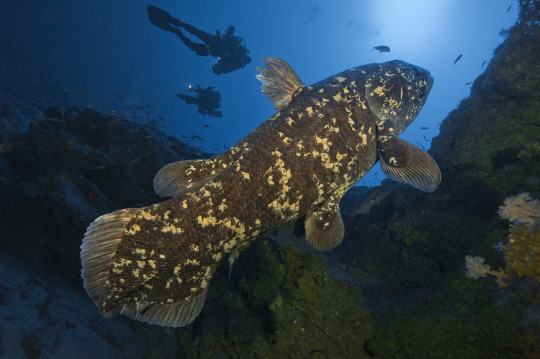
(image id: a wild coelacanth. It is a large, mostly grey fish with splotches of yellowish scales. Its fins are attached to fleshy lobes. It is seen from the side, facing the top right corner of the picture)
Coelacanth fossils had been known since the 1800s and they were believed to have gone extinct in the late Cretaceous period. That was until December 1938, when a museum curator named Marjorie Courtenay-Latimer was informed of an unusual specimen that had been pulled in by local fishermen. After being unable to identify the fish, she contacted a friend, ichthyologist J. L. B. Smith, who told her to preserve the specimen until he could examine it. Upon examining it early next year, he realized it was indeed a coelacanth, confirming that they had survived, undetected, for 66 million years. Note that fishermen living in coelacanth territory were already aware of the fish before they were formally described by science. Coelacanths are among the most famous examples of a lazarus taxon. This term, in the context of ecology and conservation, means a species or population that is believed to have gone extinct but is later discovered to still be alive. While coelacanths are among the oldest living lazarus taxa, they aren't the oldest. They are beaten out by a genus of fly (100 million years old) and a type of mollusk (over 300 million years old).

(image: a coelacanth fossil. It is a dark brown imprint of a coelacanth on white rock. Its skeleton is visible in the imprint)
Coelacanths are one of only two surviving groups of lobe-finned fish along with the lungfishes. Lobe-finned fish are bony fish notable for their fins being attached to muscular lobes. By contrast, ray-finned fish (AKA pretty much every fish you've ever heard of that isn't a shark) have their fins attached directly to the body. That may not sound like a big difference, but it actually is. The lobes of lobe-finned fish eventually evolved into the first vertebrate limbs. That makes lobe-finned fish the ancestors of all reptiles, amphibians, and mammals, including you. In fact, you are more closely related to a coelacanth than a coelacanth is to a tuna. Coelacanths were thought to be the closest living link to tetrapods, but genetic testing has shown that lungfish are actually closer to the ancestor of tetrapods.
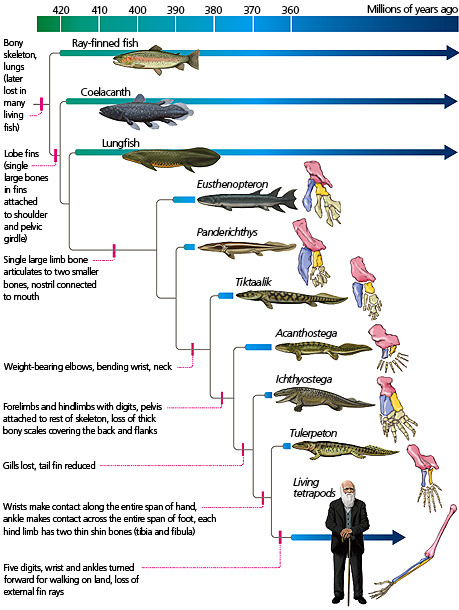
(image id: a scientific diagram depicting the taxonomic relationships of early lobe-finned fish showing their evolution to proto-tetrapods like Tiktaalik and Ichthyostega, to true tetrapods. Source)
There are two known living coelacanth species: the west Indian ocean coelacanth (Latimeria chalumnae) and the Indonesian coelacanth (L. menadoensis). Both are very large fish, capable of exceeding 2 m (6.6 ft) in length and 90 kg (200 lbs). Their wikipedia page describes them as "plump", which seems a little judgmental to me. Their tails are unique, consisting of two lobes above and below the end of the tail, which has its own fin. Their scales are very hard and thick, acting like armor. The mouth is small, but a hinge in its skull, not found in any other animal, allows the mouth to open extremely wide for its size. In addition, they lack a maxilla (upper jawbone), instead using specialized tissue in its place. They lack backbones, instead having an oil-filled notochord that serve the same function. The presence of a notochord is the key characteristic of being a chordate, but most vertebrates only have one in embryo, after which it is replaced by a backbone. Instead of a swim bladder, coelacanths have a vestigial lung filled with fatty tissue that serves the same purpose. In addition to the lung, another fatty organ also helps control buoyancy. The fatty organ is large enough that it forced the kidneys to move backwards and fuse into one organ. Coelacanths have tiny brains. Only about 15% of the skull cavity is filled by the brain, the rest is filled with fat.
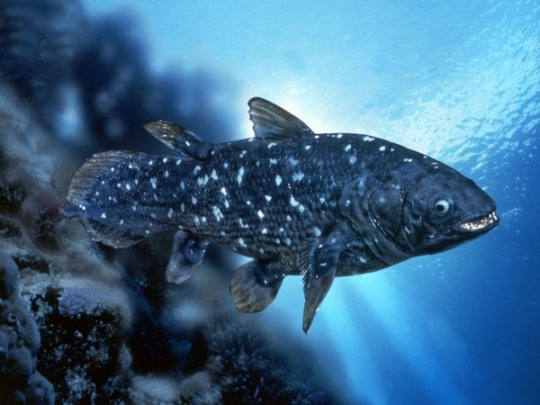
(image id: a coalacanth. It is similar to the one on the above image, but this one is blue in color and the head is seen more clearly, showing an open mouth and large eye)
One of the reasons it took so long for coelacanths to be rediscovered is their habitat. They prefer to live in deeper waters in the twilight zone, between 150 and 250 meters deep. They are also nocturnal and spend the day either in underwater caves or swimming down into deeper water. They typically stay in deeper water or caves during the day as colder water keeps their metabolism low and conserves energy. While they do not appear to be social animals, coelacanths are tolerant of each other's presence and the caves they stay in may be packed to the brim during the day. Coelacanths are all about conserving energy even when looking for food. They are drift feeders, moving slowly with the currents and eating whatever they come across. Their diet primarily consists of fish and squid. Not much is known about how they catch their prey, but they are capable of rapid bursts of speed that may be used to catch prey and is definitely used to escape predators. They are believed to be capable of electroreception, which is likely used to locate prey and avoid obstacles. Coelacanths swim differently than other fish. They use their lobe fins like limbs to stabilize their movements as they drift. This means that while coelacanths are slow, they are very maneuverable. Some have even been seen swimming upside-down or with their heads pointed down.
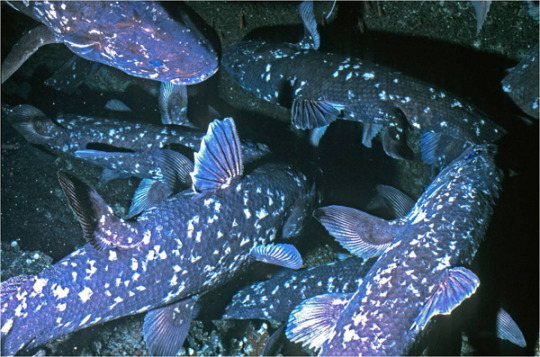
(image: an underwater cave wilt multiple coelacanths residing in it. 5 are clearly visible, with the fins of others showing from offscreen)
Coelacanths are a vary race example of bony fish that give live birth. They are ovoviviparous, meaning the egg is retained and hatches inside the mother. Gestation can take between 2 and 5 years (estimates differ) and multiple offspring are born at a time. It is possible that females may only mate with a single male at a time, though this is not confirmed. Coelacanths can live over 100 years and do not reach full maturity until age 55. This very slow reproduction and maturation rate likely contributes to the rarity of the fish.
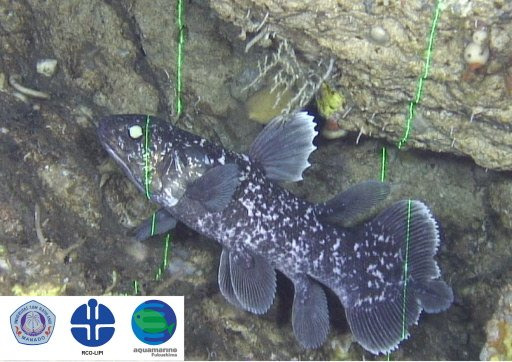
(image: a juvenile coelacanth. Its body shape is the same as those of adults, but with proportionately larger fins. There are green laser beams shining on it. These are used by submersibles to calculate the size of animals and objects)
Coelacanths are often described as living fossils. This term refers to species that are still similar to their ancient ancestors. The term is losing favor amongst biologists due to how misleading it can be. The term os often understood to mean that modern species are exactly the same as ancient ones. This is not the case. Living coelacanth are now known to be different than those who existed during the Cretaceous, let alone the older fossil species. Living fossils often live in very stable environments that result in low selective pressure, but they are still evolving, just slower.
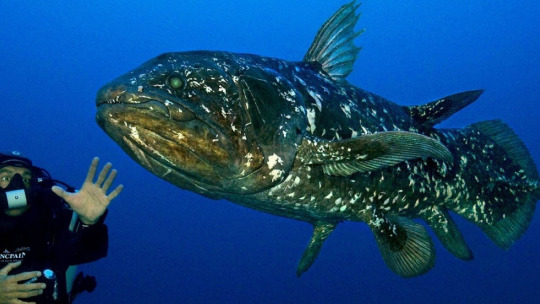
(image: a coelacanth swimming next to a SCUBA diver)
Because of the rarity of coelacanths, it's hard to figure out what conservation needs they have. The IUCN currently classifies the west Indian ocean coelacanth as critically endangered (with an estimated population of less than 500) and the Indonesian coelacanth as vulnerable. Their main threat is bycatch, when they are caught in nets intended for other species. They aren't fished commercially as their meat is very unappetizing, but getting caught in nets is still very dangerous and their slow reproduction and maturation means that it is long and difficult to replace population losses. There is an international organization, the Coelacanth Conservation Council, dedicated to coelacanth conservation and preservation.
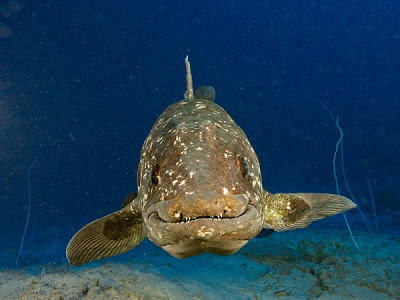
(image: a coelacanth facing the camera. The shape of its mouth makes it look as though it is smiling)
#wet beast wednesday#coelacanth#marine biology#biology#zoology#ecology#animal facts#fish#fishblr#old man fish#lobe-finned fish#sarcopterygii
1K notes
·
View notes